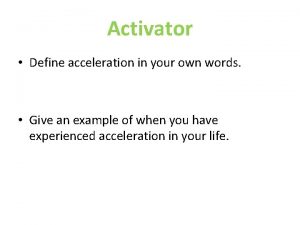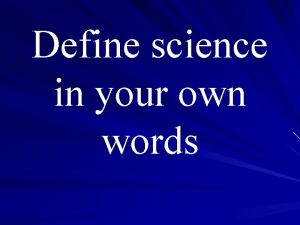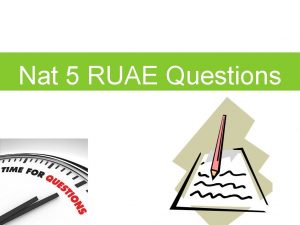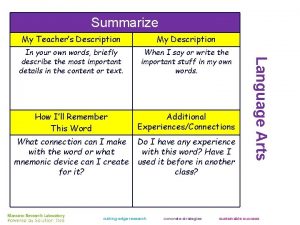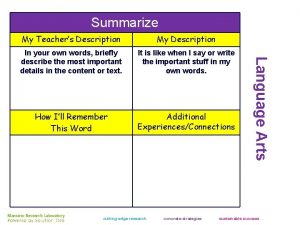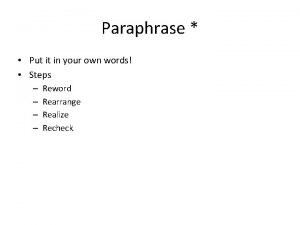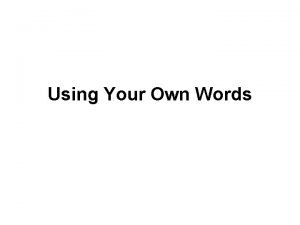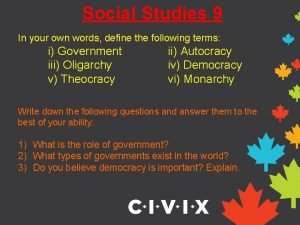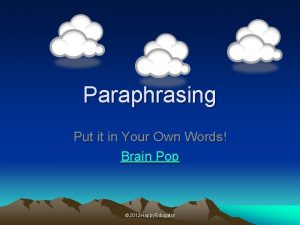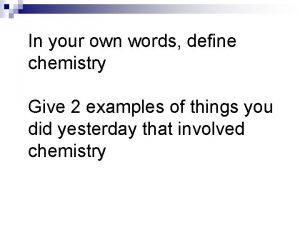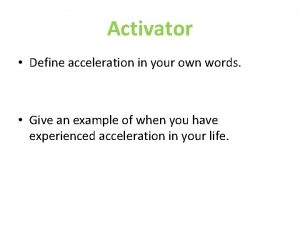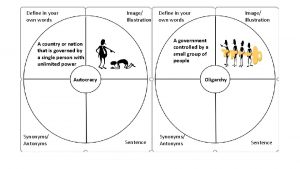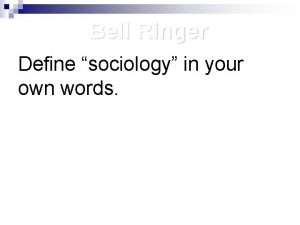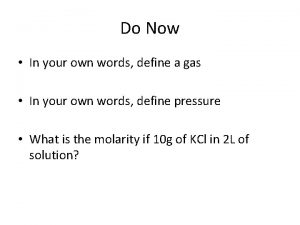In your own words define chemistry Give 2






















- Slides: 22

In your own words, define chemistry Give 2 examples of things you did yesterday that involved chemistry

Chapter 1 Introduction to Chemistry

1. 1 Chemistry n Matter is anything that has ______ and takes up _______. n What is Chemistry? *Because living and nonliving things are made of matter, chemistry affects all aspects of life and most natural events.

Areas of Study n Five traditional areas of study: 1. Organic Chemistry – Study of chem. containing carbon 2. Inorganic Chemistry-no carbon/found mainly in non-living things 3. Biochemistry-study of processes that take place in organisms (muscle contraction, digestion) 4. Analytical Chemistry-composition of matter 5. Physical Chemistry-mechanism, rate, energy transfer that occurs when matter changes

Pure and Applied Chemistry n n n Pure chemistry-the pursuit of chemical knowledge for its own sake Applied chemistry-research that is directed toward a practical goal or application *Pure research can lead to an application, but an application can exist before research is done to explain how it works. Example: Nylon, Aspirin, Technology

Why should we study chemistry? n. Explain the natural world n. Prepare n. Be for a career an informed citizen Knowledge

1. 2 Chemistry Far and Wide n Chemists design materials to fit specific needs n Often inspired by nature (burrs/cloth) *Macroscopic world *Microscopic world

What impact do chemists have on… Energy n Medicine and Biotechnology n Agriculture n The Environment n The Universe n

Energy n Chemists play an essential role in finding ways to conserve energy, produce energy, and store energy. Conservation? Production? Storage?

Medicine and Biotechnology n Chemistry supplies the medicines, materials, and technology that doctors use to treat their patients.

Agriculture n Chemists help to develop more productive crops and safer, more effective ways to protect crops.

The Environment n Chemists help to identify pollutants and prevent pollution.

The Universe n Chemists gather data from afar and analyze matter that is brought back to Earth.


1. 3 Thinking Like a Scientist

n Chemistry – Alchemy (Alchemists developed the tools and techniques for working with chemicals) n Antoine Lavoisier (late 1700 s) helped transform chemistry from a science of observation to the science of measurement it is today. (O 2 required for a material to burn)

The Scientific Method A logical, systematic approach to the solution of a scientific problem 1. State the problem 2. Collect background information/Research 3. Hypothesis – able to test 4. Experiment – variables/control 5. Make observations/Data collection 6. Conclusion-accept or reject hypothesis 7. Publish results n

Experiment n n Procedure used to test a hypothesis Variables/factors that can change a. Independent variable (manipulated) – the variable that you ______ during an experiment b. Dependent variable (responding) – the variable that is _________ during the experiment *the experiment must produce the same result no matter how many times it is repeated, or by whom…the importance of publishing procedure with results

Theory A well-tested explanation for a broad set of observations (ex: MO, VSEPR p. 232) *Can a theory change? n Scientific Law -a concise statement that summarizes the results of many observations and experiments (The Gas Laws p. 418) When can a hypothesis become a theory?

n Why are collaboration and communication important? n How has communication among scientists changed over time?

1. 4 Problem Solving in Chem n Develop a plan and implement n Analyze, calculate, evaluate n See sample problem 1. 1 (p. 30)

Question n Does the amount of sleep a student gets affect how well he/she does in school?
 In your notebook, define the following
In your notebook, define the following Define acceleration
Define acceleration Define manifest destiny in your own words
Define manifest destiny in your own words Photography comes from 2 words meaning?
Photography comes from 2 words meaning? Loyalty in your own words
Loyalty in your own words Science in my own words
Science in my own words Give us your hungry your tired your poor
Give us your hungry your tired your poor What type of sae is when you own your own business
What type of sae is when you own your own business Making new words your own
Making new words your own How to do ruae questions
How to do ruae questions Description in your own words
Description in your own words Description in your own words
Description in your own words Why does juliet kiss romeo’s lips?
Why does juliet kiss romeo’s lips? Put into your own words
Put into your own words Word choice national 5 english
Word choice national 5 english Fccla creed meaning
Fccla creed meaning Creed for fccla
Creed for fccla Using your own words
Using your own words Oligarchy definition
Oligarchy definition Put it in your own words
Put it in your own words Summarise in your own words
Summarise in your own words Making new words your own lesson 2
Making new words your own lesson 2 Objectives of intramurals
Objectives of intramurals

